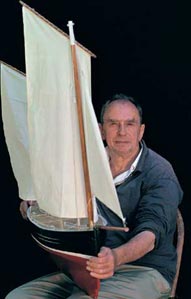Ian Hamilton Finlay
| Ian Hamilton Finlay | |
|---|---|

Ian Hamilton Finlay at Little Sparta, 1994
|
|
| Born |
28 October 1925 Nassau, Bahamas |
| Died | 27 March 2006 (aged 80) Edinburgh, Scotland |
| Nationality | Scottish |
| Known for | poetry, concrete poetry, art, gardens, sculpture, publishing |
| Notable work |
|
Ian Hamilton Finlay, CBE (28 October 1925 – 27 March 2006) was a Scottish poet, writer, artist and gardener.
Finlay was born in Nassau, Bahamas, of Scottish parents. He was educated at Dollar Academy, in Clackmannanshire and later Glasgow School of Art. At the age of 13, with the outbreak of the Second World War, he was evacuated to family in the countryside. In 1942, he joined the British Army. Finlay was married twice and had two children, Alec and Ailie. He died in Edinburgh.
At the end of the war, Finlay worked as a shepherd, before beginning to write short stories and poems, while living on Rousay, in Orkney. He published his first book, The Sea Bed and Other Stories in 1958 with some of his plays broadcast on the BBC, and some stories featured in The Glasgow Herald.
His first collection of poetry, The Dancers Inherit the Party was published in 1960 by Migrant Press with a second edition published in 1962. The third edition, published by Fulcrum Press (London) in 1969, included a number of new poems and was inaccurately described by the publisher as a first edition and which led to a complex legal dispute.Dancers was included in its entirety in a New Directions annual a few years later.
In 1963, Finlay published Rapel, his first collection of concrete poetry (poetry in which the layout and typography of the words contributes to its overall effect), and it was as a concrete poet that he first gained wide renown. Much of this work was issued through his own Wild Hawthorn Press, in his magazine 'Poor.Old.Tired.Horse'.
Finlay became notable as a poet, when reducing the monostich form to one word with his concrete poems in the nineteen sixties. Repetition, imitation and tradition lay at the heart of Hamilton's poetry, and exploring ' the juxtaposition of apparently opposite ideas'.
...
Wikipedia
